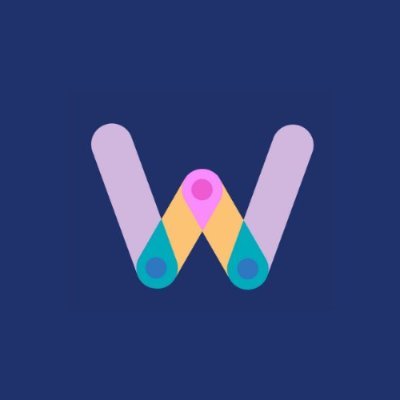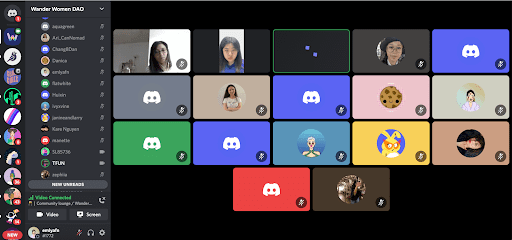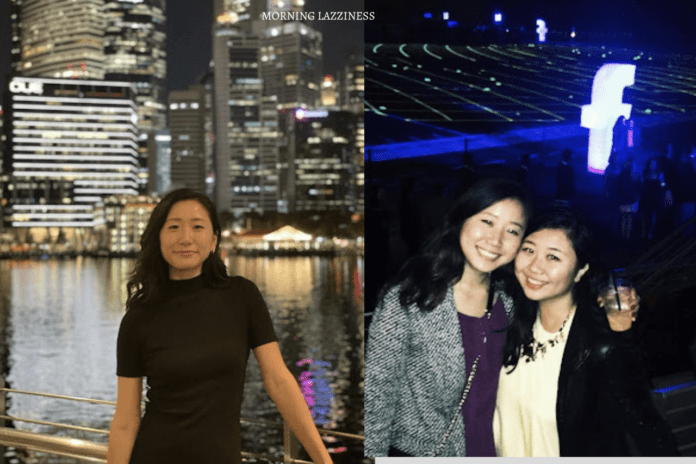As a part of the Morning Lazziness series about empowering women who are encouraging and doing incredible things with their ideas in society, I had the pleasure of interviewing Ivy Xu and Emily Fang.
Ivy Xu and Emily Fang, created a FB community called Asian Wander Women, initially grown organically from a group of friends based in San Francisco—during the pandemic, many of them left the city, moved overseas, started their own ventures, and found interesting ways to sustain and build businesses. In just a year, they have attracted more than 1k diverse female talents. They wanted to find a better way to organize the community so as to empower more women to lead unconventional lives, build products and services together, and get paid. Thus, Wander Women DAO (WWD), a venture studio, was born recently to achieve that vision.
Thank you so much for joining us in this interview series! Before we dive in, our readers would love to learn a bit more about you. Can you tell us a story about what brought you to this specific career path?
The majority of my career has been developing user communities for tech companies, notably for Google Hardware, OmniSci, and Stripe. I found that I really loved gathering people into meaningful spaces around a shared interest or mission. It was fun for me to connect with people together, who I believed would get along well or could learn something from each other. It was like magic to me, connecting the dots. Community management has been an enigma for a long time, mistaken for social support most of the time, but it’s more than that.
You are facilitating conversations that can turn into sales leads, customer success stories, product feedback, user engagement, and more—it becomes a flywheel that touches all parts of the business. Only recently have companies acknowledged the power of treating and segmenting your users like MVPs and tapping into the group who loves your product. I realized I loved this space and didn’t want to leave.
Can you tell us the most interesting story that happened to you since you began your career?

In 2020, I left San Francisco and made the move to go overseas to Singapore to travel to Southeast Asia. Covid hit, but I didn’t want to leave so I took a media job in tech and got to stay with an employment pass. During the pandemic, my friend Ivy and I decided to build an online community on Facebook, which grew into this vibrant network of 20-30s entrepreneurial, high performing, and global-minded women who all stemmed from the Bay Area, but decided to leave and go elsewhere. It started with a group of 50 and then it began growing and growing, simply because of 2nd or 3rd-degree connections, and then later on by recommendations. It felt so impactful because all of this was organic growth and people saw the value in being part of this group. The management of the group became quite large as Ivy and I did this on a volunteer basis and as we scaled, we started thinking about how we could get our members to step up and contribute. It was still a robust community being managed by the two of us. Ivy, my cofounder, heard about DAO governance and how decentralized communities came together for a set mission, whether it’s to build, to invest, or to socialize, it was fascinating that groups were finding ways to get everyone involved and have skin in the game. That’s why we decided to organize and use tokenization as a means for people who are serious to become involved—we’re launching an NFT project in June!
How have you used your success to bring goodness to the world?
I really believe in intentional connectivity and recognizing people for their hard work. Call it my community empathy, but when you build communities, you get really good at curation, remembering people, and knowing how to connect whom with whom. Additionally, throughout my career, I realize that people don’t need much to be happy—they do, however, need to be recognized for their work and efforts; I help people get the recognition they deserve.
None of us are able to achieve success without some help along the way. Is there a particular person you are grateful for who helped get you to where you are? Can you share a story about that?

I’m grateful to my older sister Jasmine, who is five years older than me. Looking back, she really pushed me to get out of my comfort zone when I was just starting out in my career. She connected me with contacts from her network, taught me the art of coffee chats and networking, and would always relay her Georgetown MBA materials to me so I could learn along. I remember this one time, I was visiting her in DC when she was working for the federal government. What I thought was an organized taco happy hour became a career chat with her friends to prepare me for the real world. We ate tacos, took tequila shots, and I learned about various careers in consulting management, and tech. I realized she was just setting me up for success and wanted to provide the resources she had at hand.
What were your most important challenges? & How did you overcome those challenges?
It’s a personal thing, to be honest. The imposter syndrome is always there. Call it what it is, but coming from an Asian household, we were taught to keep our heads down and be humble. It’s hard for me to say that I’m a founder or a creator, but I am. I had to learn how to fully own it, and confidently own it. It helps with practice—I get out there and shill our project. It’s something that makes me proud because we’re changing the future of work, how women can get paid, and bringing access to global talent together.
If you don’t believe in yourself, why should others?
What’s your piece of advice for readers who want to achieve wealth and success in life?
One of my favorite quotes is that risk is the price of admission for an extraordinary life. Wealth and success isn’t what we should be aiming for—I think you’ll just always be wanting more. What I believe people should aim for is finding ways to provide impact and give back to causes they care about, to make meaningful relationships, and to be at peace with who they are and what they have in all stages of their life.
What’s your business model? How will the DAO make money?
Our initial launch will be through a limited collection of 5000 NFTs in June 2022—you can follow along on our Twitter @wanderwomendao. 5000 mint spots will be granted through a mintlist, where 75% of the primary sales from mint will go back to the DAO to fund projects, pay our contributors, and used for future initiatives that we vote on; secondary sales will also go back to the DAO as well. The NFT is a ticket that provides access to the DAO community. Community members are co-creators and co-owners in all the projects we build.
What’s your piece of advice for people who want to quit their 9-5 job and start a business?
Evaluate your own risk tolerance. How much do you need to have saved to make you feel ready to take the jump? Are you okay with the worst possible outcome? What would be the worst possible outcome? These are questions that should be explored before quitting a 9-5 job and starting a business. Funnily enough, I’m going through this as well and it’s a lot of mental planning.
What is the biggest sacrifice you’ve made in starting or running your business?
Sleep and socialization. Like Paula Pant said along the lines of, “You can afford anything, but not everything.”
The future of the digital world might be ruled by blockchain and cryptocurrency. Do you think it would be challenging for all age groups to gain knowledge about the same? How can we educate them?
There’s a ton of onboarding projects and DAOs that focus on this, most notably Odyssey DAO, Curious Addys, Surge NFT, and more. Even Twitter threads are educating users to onboard into web3. From left to right, there are communities popping up to serve the next wave of learners. It will be challenging for all age groups to understand and learn, but it’s like learning how to use a new iPhone—it takes time and relevancy to get folks onboarded. My advice is to find communities that you feel safe in and can relate to—that’s why I myself reside and support many female lead communities in crypto. They break it down into bite-size pieces and host speaker panels; I see content being more transferred into relatable knowledge sharing. If it reads like a thesis, of course, people will be averse to it, but if we make it simple and analogous, everyone can learn.
What do you think could be the future of NFT? How useful can they be for everyone?
Depends on how people want to use it. Some can perceive it as rarities, mainly for the art itself like a collection. Some will use it as a lifetime membership to gain access to exclusive events, connections, and knowledge. Some will hold NFTs for the technology and the impactful change it can bring to their careers working in web3. I believe it’ll continue to evolve—I don’t think it’ll be hype, I think it’s here to stay.
Do you think NFTs, which are open to virtual reality, could adversely impact our health due to increased screen time?
Yes and no. I’ve seen NFTs actually bring people out more to gather IRL events. Many NFT projects are hosting events around the world, facilitating connections for the first time. Maybe it’s from the isolation during the pandemic that people just want to meet in person. I will say that NFT projects have a tech stack that includes platforms like Twitter and Discord, meaning people are on their phones or laptop more to keep up with the web3 happenings. I know I’ve had more screen time, but it’s also because I’m building a project at the moment.
What would you tell yourself ten to twenty years ago that you wish you knew then?
Trying to impress other people is a complete waste of time. Surround yourself with the people you look up to and that have the attributes that you want—ask for their guidance and mentorship while you can.
Lastly, what do you think this world needs the most?
Authenticity. We’re human—we need more of that.


